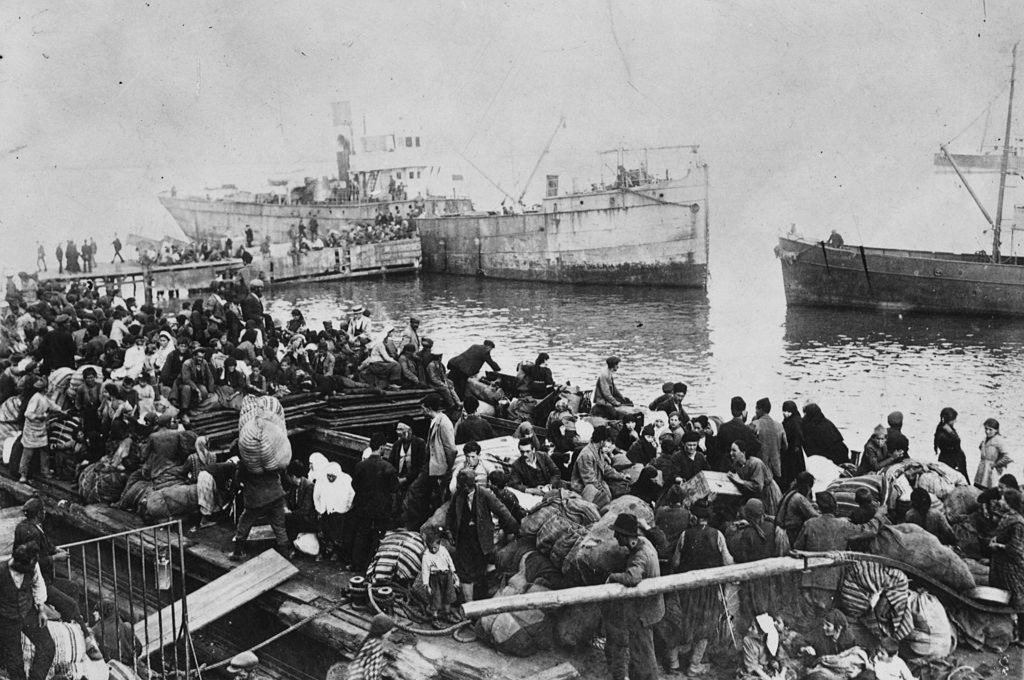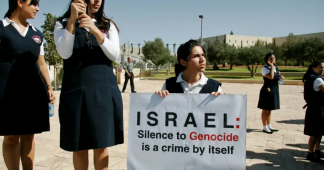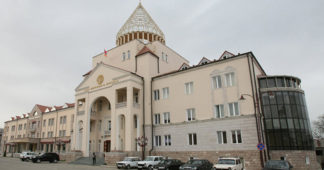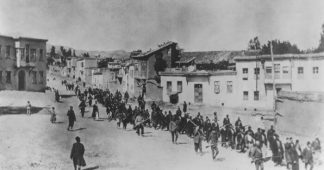by Uzay Bulut
- “We have only one sentence for Greece: Do not forget Izmir [the city of Smyrna]. Your occupying the [Aegean] islands will not stop us; we will do what is necessary when the time comes. You know what we say: ‘Unexpectedly one night we shall come to [conquer] you.” — Turkish President Recep Tayyip Erdogan, sondakika.com, September 4, 2022.
- “The final years of the Ottoman Empire were catastrophic for its non-Turkish, non-Muslim minorities. From 1913 to 1923, its rulers deported, killed, or otherwise persecuted staggering numbers of men, women and children in an attempt to preserve ‘Turkey for the Turks,’ setting a modern precedent for how a regime can commit genocide against its own citizens in pursuit of political ends, while largely escaping accountability.” — George N. Shirinian, Genocide in the Ottoman Empire: Armenians, Assyrians, and Greeks, 1913-1923.
- The Turkish attacks against the Greeks and Armenians of Smyrna began [in 1922] with looting, rapes and massacres, and ended with a fire that destroyed the Christian districts of the city.
- “In September 1922, the richest city of the Mediterranean was burned, and countless numbers of Christian refugees killed. The city was Smyrna, and the event was the final episode of the 20th Century’s first genocide — the slaughter of three million Armenians, Greeks and Assyrians by the Ottoman Empire. The slaughter at Smyrna occurred as warships of the great powers stood by — the United States, Great Britain, France and Italy.” — Lou Ureneck, Smyrna, September 1922.
- The Republic of Turkey actually boasts of its genocide.
- Since the founding of the Republic of Turkey in 1923, no factual information has been taught to Turkish schoolchildren about the extreme brutality, massacres, rapes, pillaging and other atrocities that indigenous Greeks and Armenians of Smyrna were subjected to at the hands of the Turks. The truth about the identity of the arsonists is categorically denied. For the past 100 years, Turkey has blamed the victims of the genocide for their own extermination.
- September 2022 marks the 100th anniversary of the genocide in Smyrna. Although the Turkish government still takes pride in its slaughter, everyone else would do well to remember and honor the memories of the victims and prevent further Turkish aggression. One way for Western governments to do this is officially to recognize the 1913-23 genocide, but above all, stop Erdogan’s continued threats against Greece.

The president of a NATO member country, Turkey’s Recep Tayyip Erdogan, is escalating his threats to invade Greece, another NATO member. On September 27, he said:
“The weapons stockpiled [by Greece] in Western Thrace and the islands make no sense to us because our power is far beyond them, but we remind you that this means a covert occupation [of Turkey by Greece]…
“We would like to remind Greece: Come to your senses. Do you think the support [for Greece] from the US and Europe will save you? It will not. You simply spin your wheels; it does nothing else.”
Erdogan has been making similar hostile statements for months. On September 4, he again targeted Greece in a public speech:
“Greeks, look at history. If you go any further, the price will be heavy. We have only one sentence for Greece: Do not forget Izmir [the city of Smyrna]. Your occupying the [Aegean] islands will not stop us; we will do what is necessary when the time comes. You know what we say: ‘Unexpectedly one night we shall come to [conquer] you.”
A week before that, on August 30, celebrated in Turkey as “Victory Day”, Erdogan said:
“We see our [Greeks] enemies’ destroying our cities during their withdrawal [from Anatolia in 1922] as proof of their vile character. Just as they are today.”
When Erdogan told Greeks “not to forget Izmir”, he was referring to Turkey’s genocidal attack against Greeks and Armenians of the city, also known as Smyrna, in 1922.
The 1913-1923 Christian genocide by Ottoman Turkey was a deliberate attempt to eliminate the Greek, Assyrian and Armenian presence in the region.
The genocide began in 1913 and expanded across Ottoman Turkey, targeting Christian and Yazidi communities. The violent campaign — motivated by both Islamic jihad and Turkish nationalism — aimed at annihilating Christian peoples of Asia Minor to create a Turkish- and Muslim-dominated country.
The first phase of the genocide was committed by the Ottoman Committee of Union and Progress, also known as the “Young Turks.” The second phase, from 1919 to 1923, including the Smyrna attack and genocide by Turkish nationalist forces, almost completed the genocide.
George N. Shirinian’s book, Genocide in the Ottoman Empire: Armenians, Assyrians, and Greeks, 1913-1923, states:
“The final years of the Ottoman Empire were catastrophic for its non-Turkish, non-Muslim minorities. From 1913 to 1923, its rulers deported, killed, or otherwise persecuted staggering numbers of men, women and children in an attempt to preserve ‘Turkey for the Turks,’ setting a modern precedent for how a regime can commit genocide against its own citizens in pursuit of political ends, while largely escaping accountability.”
Before the 1922 genocide, Smyrna, an ancient, prosperous, cosmopolitan city built by Greeks, and known as the “Pearl of the Orient” on the Aegean coast, was primarily Greek with large Armenian and other non-Muslim communities. This month marks the 100th commemoration if its destruction.
James Marketos, an attorney who sits on the board of the American Hellenic Institute, said in 2012:
“From ancient times, and through the Roman, Byzantine and Ottoman ages, the city remained essentially Greek. The later centuries saw the advent of Armenian, Turkish, Jewish, European and American influences, but through it all, the predominant spirit remained Greek.”
“In that society,” wrote scholars Evangelia Boubougiatzi, Ifigenia Vamvakidou and Argyris Kyridis, “Greeks had the dominant position, both in a demographic and an economic level.”
The Turkish attacks against the Greeks and Armenians of Smyrna began with looting, rapes and massacres, and ended with a fire that destroyed the Christian districts of the city.
Eyewitness reports state that the fire began on September 13, 1922 — four days after Turkish forces retook control of the city from the Greek administration — and lasted until September 22. A short documentary produced by Glenn Beck describes the Smyrna fire.
Many of the genocide survivors fled to neighboring Greece. Properties and estates that the victims left behind in Smyrna were illegally seized by Turks.
Scholar Lou Ureneck describes the genocide of Smyrna:
“In September 1922, the richest city of the Mediterranean was burned, and countless numbers of Christian refugees killed. The city was Smyrna, and the event was the final episode of the 20th Century’s first genocide — the slaughter of three million Armenians, Greeks and Assyrians by the Ottoman Empire. The slaughter at Smyrna occurred as warships of the great powers stood by — the United States, Great Britain, France and Italy.”
The Republic of Turkey actually boasts of its genocide. Turkey still claims it was the Greek military that set fire to Smyrna, destroying much of the city. The “1922 victory”, which the Turkish state refers to as “the liberation or salvation of Izmir” is annually celebrated in official and non-official ceremonies. Despite all the evidence, the fire is solely referred to in Turkish schools as part of the Greek-Turkish war, in which, according to Turkish historiography, “Turks emerged victorious against the invading Greeks.”
Since the founding of the Republic of Turkey in 1923, no factual information has been taught to Turkish schoolchildren about the extreme brutality, massacres, rapes, pillaging and other atrocities that indigenous Greeks and Armenians of Smyrna were subjected to at the hands of the Turks. The truth about the identity of the arsonists is categorically denied. For the past 100 years, Turkey has blamed the victims of the genocide for their own extermination.
In 2007, however, the International Association of Genocide Scholars (IAGS) officially acknowledged the genocide inflicted on the Armenian, Assyrian and Greek populations of the Ottoman Empire. IAGS’ resolution stated:
“Whereas the denial of genocide is widely recognized as the final stage of genocide, enshrining impunity for the perpetrators of genocide, and demonstrably paving the way for future genocides.”
Turkey’s continual denial of its genocide, and even its callous pride in the event, has for decades been accompanied by the destruction, abuse and appropriation of the Greek and Armenian cultural heritage in the country. On June 21, 2019, Turkish media reported that the Saint-Jean Theologos Greek Girls School in Smyrna, which has been empty since 1922, was plundered; its doors and windows removed, and its valuables looted. The historic building, now owned by Turkish Undersecretariat of the Treasury, has mostly been used by homeless drug addicts.
According to a recent report in the Turkish media. the Armenian Surp Sarkis Church in the Menemen district of Smyrna will be “restored” as a “Memorial Museum Science and Art Centre” after being used as a warehouse and a stable.
September 2022 marks the 100th anniversary of the genocide in Smyrna. Although the Turkish government still takes pride in its slaughter, everyone else would do well to remember and honor the memories of the victims and prevent further Turkish aggression. One way for Western governments to do this is officially to recognize the 1913-23 genocide, but above all, stop Erdogan’s continued threats against Greece.
* Uzay Bulut, a Turkish journalist, is a Distinguished Senior Fellow at the Gatestone Institute.
We remind our readers that publication of articles on our site does not mean that we agree with what is written. Our policy is to publish anything which we consider of interest, so as to assist our readers in forming their opinions. Sometimes we even publish articles with which we totally disagree, since we believe it is important for our readers to be informed on as wide a spectrum of views as possible.











